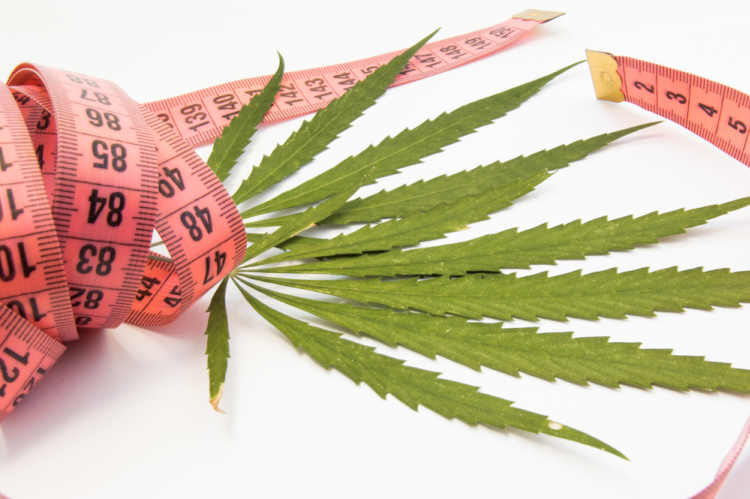Whether we seek its medical or recreational benefits, historically those of us who use cannabis have been stigmatized for being lazy, unmotivated, and physically unfit. All stereotypes aside, in truth there’s a reason for this: As research (and plenty of anecdotal evidence) suggests, the cannabis plant’s appetite-stimulating properties—aka “the munchies”—are real.
We’ll return to that topic in a moment. But stereotypes notwithstanding, a new study published in the International Journal of Epidemiology suggests something quite surprising. On the whole, evidence suggests cannabis users tend to be less overweight or obese than those who abstain.
What’s more, this study isn’t an outlier. Instead, it corroborates several earlier papers drawing links between cannabis and weight loss. They indicate that in general, cannabis users tend to be more trim, and even have lower cholesterol levels, than non-users.
So, what’s the straight dope? As you might expect, the story is complicated. But we’ll share what we know about the science behind this phenomenon. Spoiler alert: Appealing though it may sound, the jury is decidedly out regarding THC, weight loss, and our metabolisms.
Does Marijuana Make You Lose Weight? The Evidence

When it was published in the spring of 2019, the University of Michigan cannabis and weight loss study caused quite a stir. It shouldn’t have: Two surveys from 2011 came to much the same conclusion. What’s more, a 2013 paper published in the American Journal of Medicine found that cannabis users typically had trimmer waistlines than non-users. Piling on even more evidence, a 2006 study indicated that cannabis use correlated with lower cholesterol levels. While cholesterol isn’t associated with weight in and of itself, it’s an indicator of general cardiovascular health, a major contributing factor associated with weight gain or loss.
There is growing evidence indicating that, contrary to expectations, recreational or medical marijuana is indeed linked with an overall healthier BMI (body mass index). Still, the question of why this might be true remains elusive. Here’s what some researchers think.
Cannabinoids for Weight Loss: Potential Causes
One of the most intensive areas of study is also the most obvious: the gut. Because it does so much more than simply digest our food, it’s described by some clinicians as “the second brain” for the crucial role it plays in our health. It’s also the site of many interactions between our bodies and cannabis compounds such as THC, the principal cannabinoid or “active ingredient” in the cannabis plant.
In one rodent-based study, mice were fed a high-fat diet to induce weight gain and given regular doses of THC. When compared with mice given no THC or a low-fat diet, the obese mice given THC lost weight and body mass. Researchers theorize that changes in the ratios between different strains of gut bacteria may be a significant factor, especially given that obese individuals tend to have a higher endocannabinoid tone—or higher levels of endocannabinoids and their receptors—than leaner individuals. In other words, THC could be playing an outsized role in the management of weight and fat proportion in those who are overweight.
Why Do People Get the Munchies?
Let’s take a little detour into one of the most storied (and misunderstood) pieces of the puzzle: The munchies. That’s the popular name given to the syndrome in which foods—especially crunchy, salty, and sweet ones—become absolutely irresistible to those experiencing a marijuana high.
Why does cannabis make you feel so hungry? Part of the answer lies in the way the plant tends to heighten sensory perception. As a 2013 study explores, the cannabinoid THC—the source of the marijuana plant’s distinctive “high”—interacts with a hormone called ghrelin which sharpens our senses of taste and smell. The result is that foods seem to taste much, much better than they normally would. This makes our response—wanting to eat more of them!—perfectly understandable.
But there’s more to the story. The cannabinoids also interact with neurons in the brain that are more commonly associated with suppressing hunger, not triggering it. Think of it as the mistaken “flipping of the switch.” As detailed in a 2015 study from Yale University, this chain reaction makes us think we’re less full than we really are. As a result, we end up eating more than we normally would and—worse still—often feeling guilty about it afterwards.
How can you avoid this pitfall? One easy way is to plan your cannabis intake so that it doesn’t conflict with a regular mealtime. This is good practice anyway, as studies suggest that sticking to a regular meal schedule is healthier for us anyway. If you’re worried about overindulging, be sure you have healthy alternatives such as fresh fruits, veggies, and natural and unprocessed snacks.
Cannabis for Weight Loss: Best Practices

This in turn suggests an obvious weight-loss strategy: consuming cannabis. Not so fast, say researchers. The mechanisms behind weight loss are both complex and not fully understood. And because every drug interaction spurs other side effects, both beneficial and less desirable, it’s a little too early to begin prescribing cannabis for weight loss. Scientists point out, for instance, that cannabis effects may trigger mania-like episodes in those people predisposed towards certain mental illnesses such as schizophrenia and bipolar disorder.
Until we know for certain how cannabis affects our weight and body mass, we recommend sticking with tried and true methods for maintaining overall health: Regular exercise, a healthy diet, and an awareness of the whole body, rather than a narrow focus on reducing weight at the expense of your overall health. Until then, consider cannabis’s potentially positive impact on weight as a possible added perk of this fascinating and ever-surprising all-natural medicine.
Medical Marijuana for Weight Loss: In Conclusion
We hope today’s post gives you insights into how you can access all the benefits of the cannabis plant while staying healthy, fit, and happy. Remember: While cannabis isn’t a substitute for a balanced diet and best practices, there is evidence that it may help support a healthier overall BMI.
Do you have other questions about the potential connections between cannabis and weight loss? Don’t hesitate to reach out; we’re always here to help!
